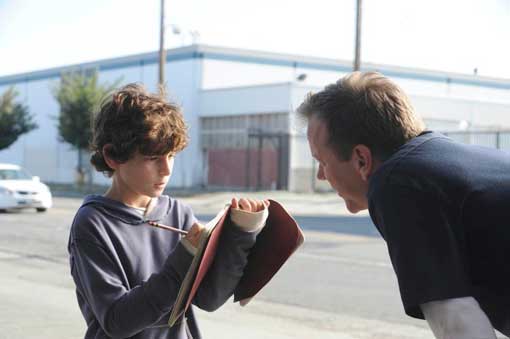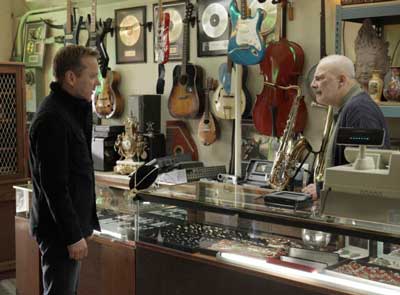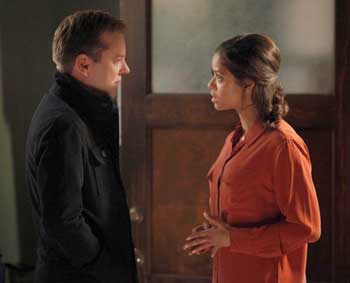
I did the pilot of Touch a disservice when I reviewed it here a few months ago. For whatever reason, I wasn't initially receptive, didn't get it; but in the back of my mind, I wanted to re-view, in the literal sense of the word, when it returned (Thursday at 9 p.m. ET on Fox).
I don't take back everything I said about the premise, but I think I missed the mark. Rewatching the pilot as well as the next two episodes helped me find it. (The Touch pilot streams free online here.)

Jake Bohm (David Mazouz), son to Kiefer Sutherland's Martin, is an emotionally challenged child who possesses an astounding gift: the ability to perceive through a series of numbers that our lives on the planet are somehow connected. The only way Martin can communicate with his son is through these numerical patterns. Jake cannot or will not speak to anyone. Martin realizes that it's his job to decipher these numbers, follow where they lead, and try to help the strangers he meets as their lives intersect according to what Jake has foreseen.
If you prefer to believe that we zig instead of zag for a preordained reason, and that there are no coincidences in life, then the premise of this show will indeed touch you.
As Sutherland has said in several interviews, he wasn't looking to return to TV after the grind of 24, but after having read the script, he simply couldn't envision another actor playing this role. Where Jack Bauer was always saving the world (not always with above-board methods), Martin in Touch is a quieter, more confused and conflicted hero, and Sutherland is the perfect actor to play him.
His performance is passionate, emotional, and nuanced, and the work he does here with Mazouz is beautiful. It's hard enough to work with kids, but especially hard when the child in the piece doesn't have dialogue. But the connection between Sutherland and Mazouz in these roles seems more intuitive than "directed," and their chemistry informs this drama.

Equally sensitive is British actress Gugu Mbatha-Raw's performance as Clea Hopkins, the concerned social worker who questions Martin's ability to care for his son since his wife's tragic death in the North Tower on 9/11. She could easily be seen as a villain, but Mbatha-Raw's empathetic performance creates a push-pull that persuades the viewer to see both sides of the argument as to Jake's future.
The fine actor Titus Welliver will be recurring as a New York fireman connected to Baum through the events of 9/11. The horror of that day lives in his eyes, the way he walks, in his anger and in his reawakening. Welliver nails it.
I stand by my assessment that, as with 24 or Lost, you may not always understand how Jake's equations lead his father to intervene in people's lives. And, because the Touch writers always seem to have to connect the dots, the situations can seem contrived and convenient, which does not satisfy. This will be a challenge for them as the show progresses. Will there be times when Martin is too late and can't save the day (it seems like there must be), and how will this be handled?
But at its best moments, Touch is a show that makes you feel positively human, if only for 42 minutes. If we could see the world as Jake sees it, where we could reach out and change each other's lives for the better, what a wonderful world this would be.